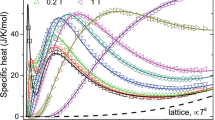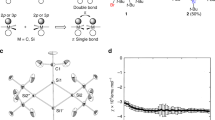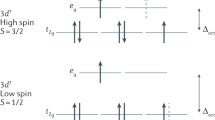Abstract
Ingram and Tapley1 and Uebersfeld and Erb2 have observed that electron spin resonance in certain carbons can be affected by oxygen. Austen and Ingram3 showed that the electron spin resonance signal given by a carbon in vacuum may be (a) broadened, (b) reduced in total integrated intensity, by exposure to oxygen at room temperature. In both cases, it was found possible to restore the signal to the value it possessed in vacuum by outgassing the sample for a few minutes at room temperature.
This is a preview of subscription content, access via your institution
Access options
Subscribe to this journal
Receive 51 print issues and online access
$199.00 per year
only $3.90 per issue
Buy this article
- Purchase on Springer Link
- Instant access to full article PDF
Prices may be subject to local taxes which are calculated during checkout
Similar content being viewed by others
References
Ingram, D. J. E., and Tapley, J. G., Chem. and Indust., 568 (1955).
Uebersfeld, J., and Erb, E., C.R. Acad. Sci., Paris, 243, 2043 (1956).
Austen, D. E. G., and Ingram, D. J. E., Chem. and Indust., 981 (1956).
Garten, V. A., and Weiss, D. E., Aust. J. Chem., 88, No. 1, 68 (1955).
Mulliken, R. S., J. Amer. Chem. Soc., 74, 811 (1952).
Author information
Authors and Affiliations
Rights and permissions
About this article
Cite this article
JACKSON, C., HARKER, H. & WYNNE-JONES, W. Electron Spin Resonance in Carbons: a New Oxygen Effect. Nature 182, 1154–1155 (1958). https://doi.org/10.1038/1821154b0
Issue Date:
DOI: https://doi.org/10.1038/1821154b0
This article is cited by
Comments
By submitting a comment you agree to abide by our Terms and Community Guidelines. If you find something abusive or that does not comply with our terms or guidelines please flag it as inappropriate.



